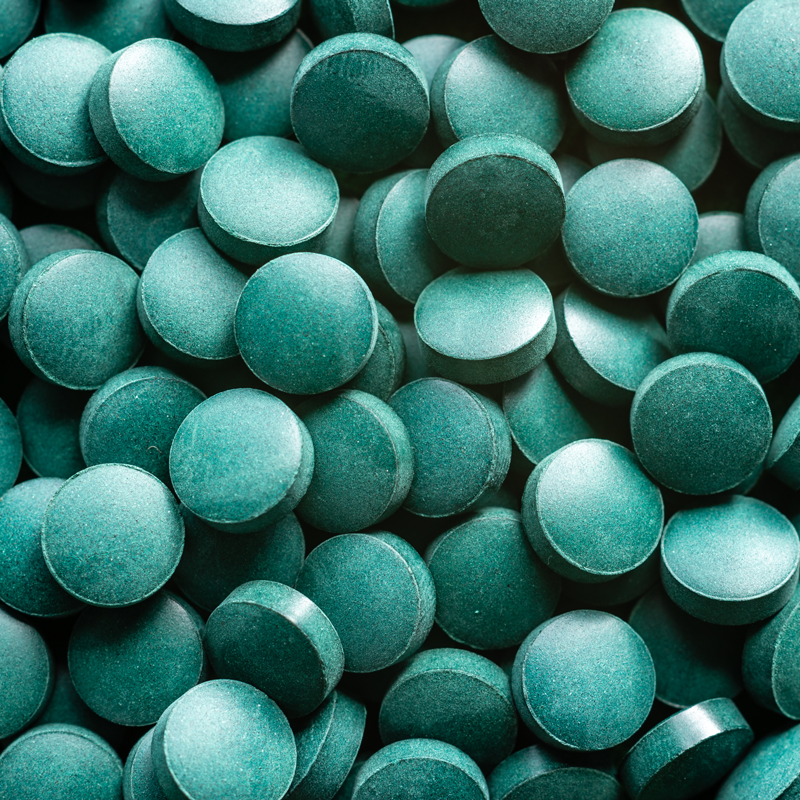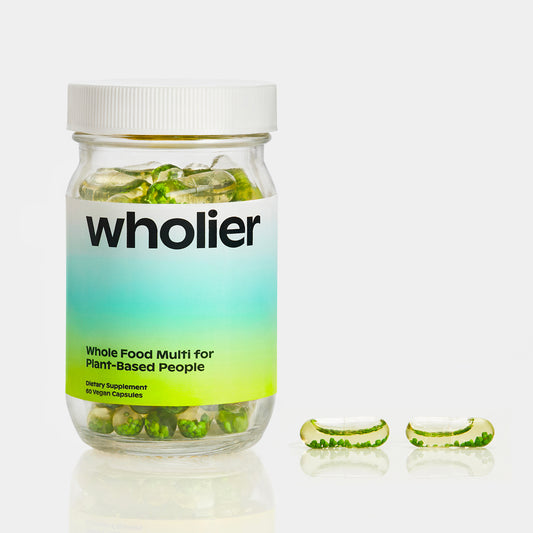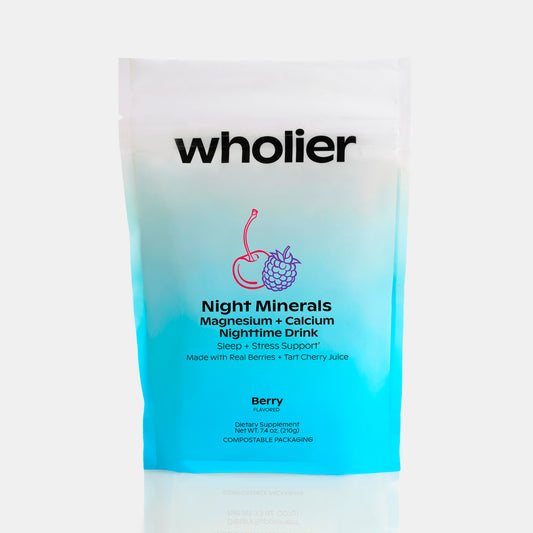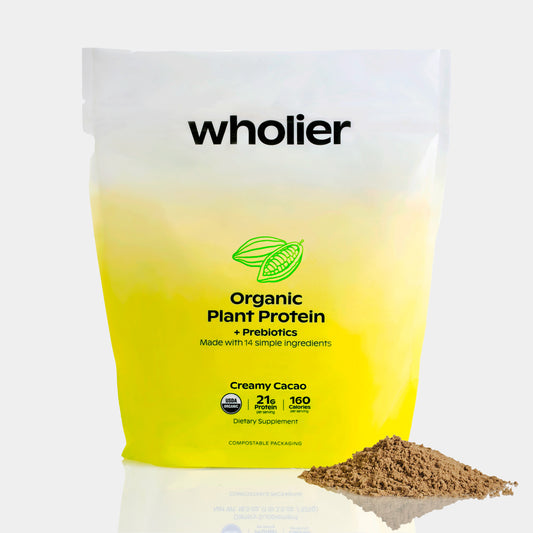
Is Iron Bad for You to Take? Exploring the Facts and Myths
Iron is an essential mineral that plays a crucial role in many bodily functions. It helps transport oxygen from the lungs to other parts of the body, improves energy production, supports immune function, and brain health.(1) However, some people may wonder if taking iron supplements can be harmful. In this article, we will explore what iron is, why it's important, and if taking iron supplements can be bad for you.
What Is Iron?
Iron is a mineral that is required for many bodily functions. The human body needs iron to produce hemoglobin, which helps transport oxygen from the lungs to other parts of the body. Hemoglobin also gives red blood cells their color.(2) Iron is present in various foods such as red meat, poultry, fish and shellfish, eggs, beans and lentils. It’s also added to breakfast cereals and some breads.
The Difference Between Heme vs. Non-Heme Iron
Iron comes in two main forms: heme and non-heme iron. Heme iron is found in animal sources such as red meat (beef or lamb), poultry (chicken or turkey), fish and seafood.(3) Non-heme iron comes from plant sources like leafy greens, beans, nuts, and fortified foods like breakfast cereals.(4)
Heme iron is more easily absorbed by the body than non-heme iron. This is why people who eat a vegetarian or vegan diet may have a higher risk of iron deficiency if they don’t consume enough plant-based sources of iron. The recommended daily intake for adults differs based on age and gender. For men over the age of 19, it's typically 8 mg/day while for women aged 19-50, it's 18 mg/day.(5)
Iron When Leading a Vegan and Vegetarian Diet
For vegans and vegetarians who don’t consume animal products, it can be challenging to obtain enough iron from their diet alone because they typically rely on non-heme sources of iron which are not as easily absorbed by the body. Therefore, vegans and vegetarians may need to consume more iron-rich foods or take supplements to maintain healthy levels of this mineral in their bodies.(6)
For athletes leading a vegan or vegetarian diet, iron is an essential nutrient to watch. Iron helps deliver oxygen to muscles during exercise, which can improve endurance and reduce fatigue.(7) Athletes who follow a vegetarian or vegan diet may be at higher risk of iron deficiency due to the lack of readily available heme iron in their diet. Therefore, athletes should aim to consume plenty of plant-based sources of iron and consider supplementation if necessary.
Understanding Iron Deficiency
Iron deficiency anemia is a condition where there’s a lack of sufficient iron in the body leading to a reduction in the number of red blood cells. This can result in fatigue, weakness, headaches, shortness of breath and other symptoms that can interfere with daily life.(8) Women are especially susceptible to iron deficiency anemia due to menstruation and pregnancy, where they can experience significant blood loss. Iron supplements are often recommended for pregnant women to help ensure that both mother and baby have the necessary amount of iron to support healthy development.(9)
Iron Toxicity: Fact or Fiction?
One concern people have about taking iron supplements is the risk of toxicity. While it's true that too much iron can be harmful, this typically only occurs with excessive intake of heme iron from animal sources. Excessive doses of heme iron can lead to a condition called “iron overload” or “hemochromatosis” which can result in liver damage, joint pain, fatigue, heart problems, and other complications.(10) However, non-heme iron supplements have a low risk of toxicity since excess non-heme iron is excreted from the body.
The recommended daily allowance (RDA) for adults is 8-18 mg/day depending on age and gender. However, doses up to 45 mg/day are considered safe for most people. High doses of iron supplements can cause gastrointestinal upset and constipation, but it is rare for non-heme iron supplements to cause toxicity. Iron toxicity typically occurs with heme iron intake above 20 mg/day.(11)
Should You Take Iron Supplements?
The question of whether you should take iron supplements depends on your individual needs. Some populations may benefit from low-dose iron supplementation. For example, women who experience heavy menstrual bleeding or are pregnant may need extra iron to maintain healthy levels. Vegetarians and vegans may also benefit from low-dose iron supplements to ensure they are getting enough of this essential nutrient.(12)
Summary
Iron is a vital mineral that plays a crucial role in the body's function. While excessive intake of heme iron can be harmful, non-heme iron supplements have a low risk of toxicity. Those who are at risk for deficiency or have been diagnosed with anemia may need supplementation under the guidance of a healthcare provider. Some populations, such as women and vegetarians/vegans, may benefit from low-dose iron supplementation.
It's important to note that iron supplements should only be taken under the direction of a healthcare provider because taking too much iron can lead to toxicity. As with any supplement or dietary change, it is always best to consult with your healthcare provider before starting any new regimen.
Consuming a varied diet that includes both plant-based and animal sources of iron is the best way to ensure you’re getting enough of this essential nutrient. Eating foods rich in vitamin C like citrus fruits, berries, and bell peppers can also help enhance non-heme iron absorption.
While excessive intake of heme iron from animal sources can be harmful, non-heme iron supplements have a low risk of toxicity and may be beneficial for meeting your daily iron needs depending on your food intake and specific health needs.
Sources:
(1) “Anemia During Pregnancy: Causes, Symptoms, and Treatment.” American Pregnancy Association. Accessed August 2, 2021. https://americanpregnancy.org/pregnancy-complications/anemia-during-pregnancy/.
(2) “Getting Enough Iron on a Vegan or Vegetarian Diet.” Harvard Health Publishing. Accessed August 2, 2021. https://www.health.harvard.edu/staying-healthy/getting-enough-iron-on-a-vegan-or-vegetarian-diet.
(3) “Iron and Iron Deficiency.” Centers for Disease Control and Prevention. Accessed August 2, 2021. https://www.cdc.gov/nutrition/infantandtoddlernutrition/vitamins-and-minerals/iron.html.
(4) “Iron Fact Sheet for Consumers.” National Institutes of Health. Accessed August 2, 2021. https://ods.od.nih.gov/factsheets/Iron-Consumer/.
(5) “Iron Fact Sheet for Health Professionals.” National Institutes of Health. Accessed August 2, 2021. https://ods.od.nih.gov/factsheets/Iron-HealthProfessional/.
(6) “Iron in the Diet.” U.S Department of Agriculture. Accessed August 2, 2021. https://www.nal.usda.gov/sites/default/files/fnic-pg-pf/181.pdf.
(7) Fitzgerald, Matt, Louise M. Burke, Gregory R. Cox, and Peter Peeling. “Iron Considerations for the Athlete: A Narrative Review.” European Journal of Applied Physiology 119, no. 6 (2019): 1463-1478. https://doi.org/10.1007/s00421-019-04159-z.
(8) “Vegetarian Diets: A Primer for Clinicians.” Academy of Nutrition and Dietetics. Accessed August 2, 2021. https://www.ncbi.nlm.nih.gov/pmc/articles/PMC6367982/.
(9) Fitzgerald, Matt, Louise M. Burke, Gregory R. Cox, and Peter Peeling. “Iron Considerations for the Athlete: A Narrative Review.” European Journal of Applied Physiology 119, no. 6 (2019): 1463-1478. https://doi.org/10.1007/s00421-019-04159-z.
(10) National Institute of Diabetes and Digestive and Kidney Diseases. “Hemochromatosis.” Accessed August 2, 2021. https://www.niddk.nih.gov/health-information/liver-disease/hemochromatosis.
(11) National Institutes of Health. “Dietary Reference Intakes (DRIs): Recommended Dietary Allowances and Adequate Intakes, Elements.” Accessed August 2, 2021. https://www.ncbi.nlm.nih.gov/books/NBK56068/table/summarytables.t4/?report=objectonly.






